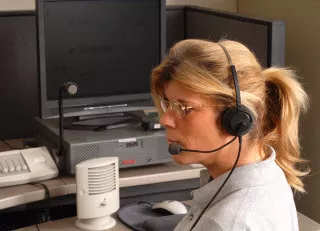
When a gunman was roaming through the halls of Virginia Tech in 2007, students frantically texted 911 for help. It seemed like a good way to contact police. They could talk to police silently. Their voices wouldn’t alert the gunman where they were hiding. But there was just one problem: Nobody got their texts.
And if that incident happened again today, in most parts of the United States, that would still be the case.
The Federal Communications Commission is pressing wireless carriers to make the technology available and strongly urging emergency dispatching centers to adopt it, in part because its survey found most people erroneously believe they can text 911 for help. But many areas are lagging behind in those efforts and it's not clear when or if that capability will ever be available.
Text-to-911 service is rarely available
So far, just 18 states have any ability to text emergency dispatchers, and of those states, only Maine and Vermont have it statewide. Indiana plans to by the end of the year. In the other states on the FCC’s list, most have only a county or two that have the service. And a supermajority of states aren’t on the list at all.
While the main wireless carriers have voluntarily agreed to offer text-to-911 service everywhere they offer the ability to send texts, wireless carriers are only half of the equation. Emergency dispatch centers also have to be equipped to receive the messages.
Few centers have integrated texting into their dispatching systems, and even those that have don't necessarily support all wireless carriers. One person may be able to text for help, but someone in the same location with a different cell service provider may not.
If that sounds confusing, it's because it is. The FCC has a workaround for the interim. If you text 911 and the dispatcher in your area isn't equipped to receive your message, you are supposed to get an automated text back advising you to actually call 911.
Why is it taking so long?
The key problem is that adding the service isn't cheap. Dallas's assistant police chief told the Dallas Morning News that the agency doesn't even have a handle on how much it would cost, only that it's too expensive to implement any time soon. Eventually, Dallas plans a complete overhaul of its dispatching system, which would allow people to not only text 911, but to send video messages as well. But that's years down the road.
Oregon also has no plans to invest in emergency texting. Aside from the cost, leaders say that dispatchers get a lot of valuable information from the tone of a caller’s voice and sounds in the background -- insight that a text just cannot provide. And they add the first question a dispatcher would text back would be, “Where can I call you?”
While it is easy to see how texting for help could be an incredible feature during a mass shooting or a home invasion, in cities that have the capability, usage has been rather limited so far, making such a financial investment an even lower priority.
Twenty-five dispatching centers in north central Texas have had texting capabilities since the beginning of last year. So far, they have received a grand total of 12 texts. Over that same period, they've handed well over one million 911 calls.
Whatever the reason for the limited use there, the FCC is continuing its nationwide push for the service. And many cities seem to think it's a good idea, too. Many just don't find the need pressing enough to implement it apart from an overall system modernization project.
What do you think? Should cities make text-to-911 service a priority? Use the Comment feature below to share your thoughts. (Note: You must be logged in to post comments. Not a member? Click here to join SCC for free.)



